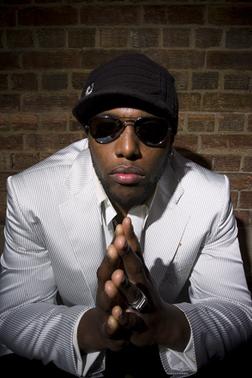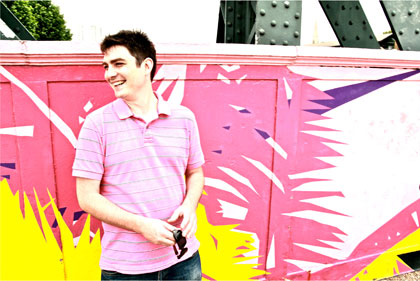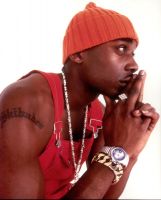Showtime! - UK dancehall on the rise again | reviews, news & interviews
Showtime! - UK dancehall on the rise again
Showtime! - UK dancehall on the rise again
A new event aims to shine new light on British/Caribbean music
This month sees an audacious attempt to showcase British dancehall music, when the Cargo venue in Shoreditch hosts the multi-artist revue Showtime!. The Heatwave collective have brought together vocalists from various UK underground scenes, linked by a strong influence from the high-energy Jamaican sounds of the past 30 or so years. While many of the artists involved have found success in crossover scenes like rave, jungle, grime and garage, the appeal of dancehall itself (also known by the overlapping terms bashment and ragga) has traditionally been restricted to predominantly black audiences.
 However, various factors including the increasing blurring of British and Jamaican slang and figures of speech, and the support of young white DJs like Gabriel Heatwave on Rinse FM and Radio 1's Toddla T, have led to a wave of popularity with new audiences, and British dancehall is increasingly making waves across cultures and subcultures. From the late Smiley Culture's 1980s hits, via names like Glamma Kid (pictured right) and Skibadee (pictured bottom) to young rising star Lady Chann, British artists with a Caribbean heritage have for many years expressed shifting social mores and identities via their unique place in pop culture.
However, various factors including the increasing blurring of British and Jamaican slang and figures of speech, and the support of young white DJs like Gabriel Heatwave on Rinse FM and Radio 1's Toddla T, have led to a wave of popularity with new audiences, and British dancehall is increasingly making waves across cultures and subcultures. From the late Smiley Culture's 1980s hits, via names like Glamma Kid (pictured right) and Skibadee (pictured bottom) to young rising star Lady Chann, British artists with a Caribbean heritage have for many years expressed shifting social mores and identities via their unique place in pop culture.
And though the scene's lyricists may on occasion tend towards the hyper-aggressive, which inevitably draws the most prurient media attention, there is an upbeat, celebratory and positive energy in the music and dances that is sometimes overlooked. An event like Heatwave's Showtime! is, then, a barometer of the social and racial attitudes of young London, as well as hopefully a riotously entertaining and energetic show. Gabriel Heatwave spoke to theartsdesk and explained how recent subcultural and technological shifts have brought new audiences to the sound he has been supporting for the last decade.
The “UK funky” sound – a tough, bass-heavy variant on house music, often with dancehall-influenced vocals that has found favour with pirate radio and rave DJs over the last few years – has been a key to the crossover, he says. “I think funky also marked a shift in UK rave culture towards 'raving' again,” he explains. “By which I guess I mean it's about dancing and partying first and foremost. The relationship that grime and dubstep have to Jamaican music is more about MCs clashing on stage, heavy sound systems and bass, dubplates [one-off cuts of tracks, with DJs competing to have the newest and rarest] and so on. Whereas funky, like grime/dubstep's predecessor in the late Nineties, garage (probably the last era when dancehall was as popular in the UK as it is now), is more about partying, which makes the link with dancehall/bashment more direct.”
Watch the video for Lady Chann's "Sticky Situation"
“The internet is definitely hugely important in helping people get to grips with dancehall,” he continues. “YouTube and MP3s have made Jamaican music massively more accessible than it was when you had to buy 7-inch vinyl from a limited number of record shops. When I started buying dancehall you had to be pretty seriously committed to get hold of new tunes; now they are a couple of clicks away. I guess the lyrics being translatable is perhaps also part of it – and you can watch the dances on YouTube.”
 Those dances can be offputting to the uninitiated, as part of dancehall culture involves outrageously sexual and eye-poppingly acrobatic moves. Gabriel (pictured left) reassures the cautiously curious though: “You definitely don't need to know the 'right' moves. It's a personal thing really; you can bubble [low-key dancing] on your own or with a partner, or be more adventurous if you've got the technique. Dancehall dancing can be pretty exhibitionist but dancehalls are also about giving people space to do their own thing. Though I guess if you're trying to pull out moves that you can't really do that can lead to embarrassment!”
Those dances can be offputting to the uninitiated, as part of dancehall culture involves outrageously sexual and eye-poppingly acrobatic moves. Gabriel (pictured left) reassures the cautiously curious though: “You definitely don't need to know the 'right' moves. It's a personal thing really; you can bubble [low-key dancing] on your own or with a partner, or be more adventurous if you've got the technique. Dancehall dancing can be pretty exhibitionist but dancehalls are also about giving people space to do their own thing. Though I guess if you're trying to pull out moves that you can't really do that can lead to embarrassment!”
Watch grime rapper/producer Wiley perform dancehall lyrics
On whether dancehall can be accepted as part of Britain's wider musical heritage, rather than as a racially segregated niche scene, he is cautiously optimistic. “I definitely don't see it as something that is only for predominantly black audiences,” he insists, “and the very mixed audiences that our nights attract are proof of its very broad appeal. Dancehall is a global music now: Germany and Japan are hugely significant in the international market. Spain and Sweden host massive reggae/dancehall festivals. Jamaican artists are starting to tour throughout Africa and Latin America.
 “I'm not sure I see it as another subset of the underground either though, partly because of its huge and diverse appeal, but also because of the huge influence that it's had – and continues to have – on other underground genres. Dancehall underpins UK rave music and the two continue to borrow from and lend to each other. I see them as having a kind of equivalence: dancehall is as broad as UK rave, rather than being another subgenre to add to the list of hardcore, jungle, garage, grime, dubstep and funky.”
“I'm not sure I see it as another subset of the underground either though, partly because of its huge and diverse appeal, but also because of the huge influence that it's had – and continues to have – on other underground genres. Dancehall underpins UK rave music and the two continue to borrow from and lend to each other. I see them as having a kind of equivalence: dancehall is as broad as UK rave, rather than being another subgenre to add to the list of hardcore, jungle, garage, grime, dubstep and funky.”
more New music
 The Songs of Joni Mitchell, Roundhouse review - fans (old and new) toast to an icon of our age
A stellar line up of artists reimagine some of Mitchell’s most magnificent works
The Songs of Joni Mitchell, Roundhouse review - fans (old and new) toast to an icon of our age
A stellar line up of artists reimagine some of Mitchell’s most magnificent works
 Album: Taylor Swift - The Tortured Poets Department: The Anthology
Taylor Swift bares her soul with a 31-track double album
Album: Taylor Swift - The Tortured Poets Department: The Anthology
Taylor Swift bares her soul with a 31-track double album
 Album: Jonny Drop • Andrew Ashong - The Puzzle Dust
Bottled sunshine from a Brit soul-jazz team-up
Album: Jonny Drop • Andrew Ashong - The Puzzle Dust
Bottled sunshine from a Brit soul-jazz team-up
 theartsdesk on Vinyl: Record Store Day Special 2024
Annual edition checking out records exclusively available on this year's Record Store Day
theartsdesk on Vinyl: Record Store Day Special 2024
Annual edition checking out records exclusively available on this year's Record Store Day
 Album: Pearl Jam - Dark Matter
Enduring grunge icons return full of energy, arguably their most empowered yet
Album: Pearl Jam - Dark Matter
Enduring grunge icons return full of energy, arguably their most empowered yet
 Album: Paraorchestra with Brett Anderson and Charles Hazlewood - Death Songbook
An uneven voyage into darkness
Album: Paraorchestra with Brett Anderson and Charles Hazlewood - Death Songbook
An uneven voyage into darkness
 theartsdesk on Vinyl 83: Deep Purple, Annie Anxiety, Ghetts, WHAM!, Kaiser Chiefs, Butthole Surfers and more
The most wide-ranging regular record reviews in this galaxy
theartsdesk on Vinyl 83: Deep Purple, Annie Anxiety, Ghetts, WHAM!, Kaiser Chiefs, Butthole Surfers and more
The most wide-ranging regular record reviews in this galaxy
 Album: EMEL - MRA
Tunisian-American singer's latest is fired with feminism and global electro-pop maximalism
Album: EMEL - MRA
Tunisian-American singer's latest is fired with feminism and global electro-pop maximalism
 Music Reissues Weekly: Congo Funk! - Sound Madness from the Shores of the Mighty Congo River
Assiduous exploration of the interconnected musical ecosystems of Brazzaville and Kinshasa
Music Reissues Weekly: Congo Funk! - Sound Madness from the Shores of the Mighty Congo River
Assiduous exploration of the interconnected musical ecosystems of Brazzaville and Kinshasa
 Ellie Goulding, Royal Philharmonic Concert Orchestra, Royal Albert Hall review - a mellow evening of strings and song
Replacing dance beats with orchestral sounds gives the music a whole new feel
Ellie Goulding, Royal Philharmonic Concert Orchestra, Royal Albert Hall review - a mellow evening of strings and song
Replacing dance beats with orchestral sounds gives the music a whole new feel
 Album: A Certain Ratio - It All Comes Down to This
Veteran Mancunians undergo a further re-assessment and reinvention
Album: A Certain Ratio - It All Comes Down to This
Veteran Mancunians undergo a further re-assessment and reinvention
 Album: Maggie Rogers - Don't Forget Me
Rogers continues her knack for capturing natural moments, embracing a more live sound
Album: Maggie Rogers - Don't Forget Me
Rogers continues her knack for capturing natural moments, embracing a more live sound

Add comment